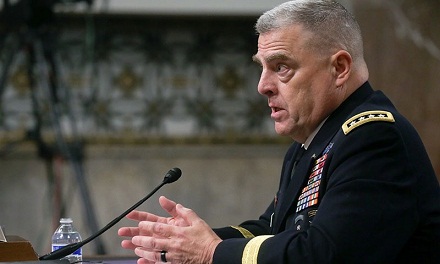KARACHI: Pakistan Stock Exchange above the 98,000 mark on Friday as share prices surged more than 2,000 points in intraday trade
WASHINGTON: The US military chief has informed American lawmakers that the loss in Afghanistan was a cumulative effect of 20 years of wrong decisions and bad planning and was not caused by any single factor, such as the Taliban’s alleged sanctuary in Pakistan.
In their latest testimony before the House Armed Services Committee on Wednesday, top US generals also blamed the Trump administration’s agreement with the Taliban for accelerating the fall of Kabul in mid-August.
Chairman of the US Joint Chiefs of Staff Gen Mark A. Milley, however, described the Taliban’s alleged ability to escape to Pakistan during 20 years of US presence in Afghanistan as a major strategic issue.
“Not effectively dealing with Pakistan as a sanctuary, major strategic issue that we are going to have to really unpack,” he told the committee.
Gen Milley made a similar demand in a Senate hearing on Tuesday, saying: “We need to fully examine the role of Pakistan sanctuary.”
But in Wednesday’s hearing, his focus was on finding the root cause of the US loss and he urged the lawmakers to focus on “a whole series of decisions that take place over 20 years,” not on a single-source.
“My assessment is, this is a 20-year war, and it wasn’t lost in the last 20 days or even 20 months. There’s a cumulative effect to a series of decisions that go way back,” Gen. Milley said.
“Whenever you get some phenomenon like a war that is lost — and it has been … (because) certainly the end state is a whole lot different than what we wanted,” Gen. Milley said. “So, whenever a phenomenon like that happens, there’s an awful lot of causal factors. And we have to figure that out. A lot of lessons learned here.”
He also cited some major decisions, by successive US administrations, that he believed contributed to the loss. Those include letting Osama bin Laden escape from Tora Bora. “We knew where he was. He was a thousand meters away, could have ended perhaps right there,” he said.
Another mistake, according to him, was shifting focus from Afghanistan to Iraq in the early stage of the war. “Pulling all the troops out of Afghanistan with the exception of a few others, major strategic decision. Pulling off intelligence advisers … (and by doing so) we blinded ourselves to our ability to see” how the war was going, he added.
Throughout Wednesday’s hearing, Republicans and Democrats sparred over who to blame for America’s failures in Afghanistan. General Frank McKenzie, the head of Central Command, linked Kabul’s collapse in August to former President Donald Trump’s deal with the Taliban, which promised a complete withdrawal of US troops.
He argued that once the US troop presence was pushed below 2,500 to meet the deal’s deadline, the unravelling of the US-backed Afghan government accelerated.
“The signing of the Doha agreement had a really pernicious effect on the government of Afghanistan and on its military — psychological more than anything else, but we set a date — certain for when we were going to leave and when they could expect all assistance to end,” Gen. McKenzie said.
You May Also Like
TEHRAN: The head of Iran’s Revolutionary Guards described the arrest warrant issued by the International Criminal Court for Israeli Prime
LOWER KURRAM: The death toll in yesterday’s gun attack on passenger vans in Khyber Pakhtunkhwa’s Lower Kurram has risen to 42,






